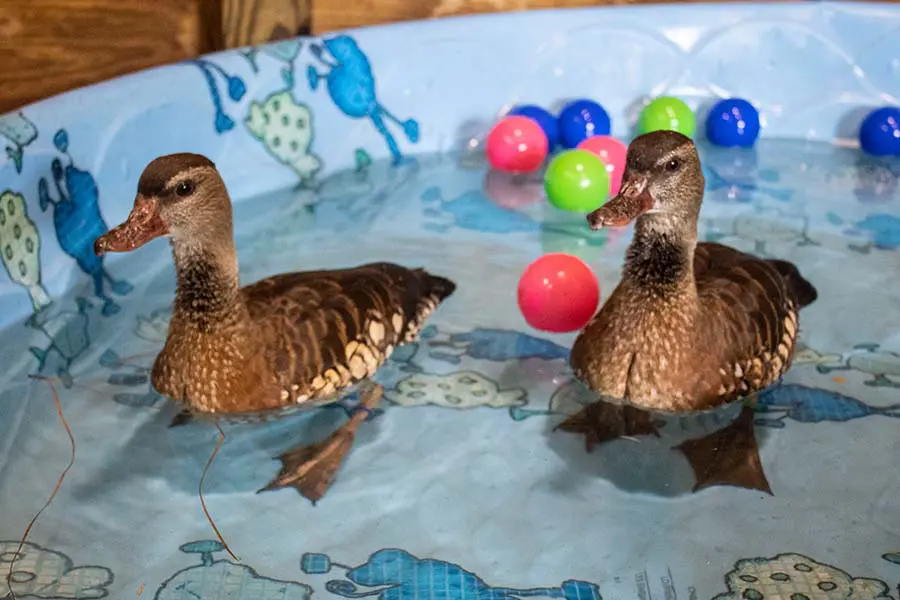

While behind the scenes, our ducks are enjoying a kiddie pool filled with toys!
Taking care of animals is a big undertaking, one our animal care staff have dedicated their careers to pursuing. Taking care of animals in quarantine, however, is an even bigger undertaking. Many of our staff members have adjusted their daily schedules and duties to ensure the safety and comfort of our bird family.
In mid-February, we received news that several cases of avian influenza (HPAI) were found in Brevard County. While we do not currently have any cases of HPAI at the Zoo, in an effort to keep our birds safe, our free-flight walk-through aviaries were closed to the public and all birds susceptible to HPAI (macaws, black swans, Osceola turkeys, ducks, etc.) were moved to indoor quarantine habitats until further notice.
Other species, like our nesting wrinkled hornbills, received modifications to their habitat to keep them from having contact with wild birds.
While guests have not been able to see most our birds while we keep them safe, our animal care team has gone the extra mile to ensure all our feathered friends are receiving top-notch care and are as protected as possible.
We planned for HPAI becoming an issue. When we learned it was in our county, enacting our plan was our top priority. This meant that all animal staff were notified and tasked with moving birds to their quarantine spaces.
“Moving animals quickly and efficiently is something we are very good at since this is what we do for hurricane preparation as well,” said Chelsea Herman, one of the Zoo’s Curator of Animals. “Keepers first had to look at each quarantine space and determine what modifications would need to be made (and quickly) to make the area as comfortable as possible,” said Kim Castrucci, another of the Zoo’s Curator of Animals.
Over the course of just a couple of days, all the birds were moved and settling into their temporary new homes, and tarps were placed where needed to keep certain species safe.
While our birds are adjusting to these new spaces, our staff has gone above and beyond to ensure they have behavior-based enrichment, or special items or foods that encourage natural behaviors. This not only keeps them physically active, but also keeps their brains working! For example, staff put fish and worms into a large water tub for Fezzik the marabou stork so that he can “go fishing” as he might do in his natural range.
“We closely monitor each bird’s behavior to ensure we maintain the highest level of welfare possible while we have them off habitat for their safety,” said Chelsea.
In addition to providing enrichment for our birds, our staff have also undertaken several extra safety precautions when working with these species. Each keeper wears appropriate personal protective equipment when working in the quarantine areas, which may include gloves, an N95 mask, booties or coveralls, depending on the habitat.
The keepers who are caring for our birds are asked to avoid certain areas where there is a more prevalent wild bird presence (such as the kangaroo yard). We also try to reduce the number of keepers working in each bird area per day to ensure the highest level of safety for birds and staff alike. This means that each day, just one keeper is assigned to each bird area and is responsible for their care from the beginning of the day to the end.
All of this on top of normal husbandry (diet, fresh water, enrichment, cleaning, etc.)! Our animal care staff have taken on many extra duties to ensure the safety of all of the birds that call the Zoo home.
To those who miss seeing our birds on habitat, we understand. We do, too. We miss saying “hello” to Thor the hyacinth macaw and laughing with Goofy the salmon-crested cockatoo. We miss feeding the lorikeets and cockatiels. Rest easy knowing all the choices the Zoo makes are for the safety and wellbeing of our animals.
While we do not have an anticipated date for the birds to be back on habitat, we will be sure to notify you on our social media channels. Stay tuned!
Brevard Zoo is an independent, not-for-profit organization that receives no recurring government funding for our operating costs. Your generous support enables us to continue to serve our community and continue our vital animal wellness, education and conservation programs.